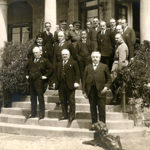Published August 19, 2009
Despite belonging to an organization that recently celebrated its founder’s two thousandth birthday, some American Catholics exhibit the attention span of fruit flies when their faith impinges on their politics. Recent responses to Benedict XVI’s Caritas in Vertitate (“Charity in Truth”) closely parallel those that greeted the last economic encyclicals: John Paul II’s Sollicitudo rei socialis (“The Church’s Social Concern”) and Centesimus Annus (“On the Hundredth Anniversary” [of Leo XIII’s Rerum Novarum]).
Caritas in Veritate was originally intended for 2007, the fortieth anniversary of Paul VI’s 1967 encyclical Populorum Progressio (“The Development of Peoples”), which first noted that “the social question has become worldwide” (PP, 3). John Paul II promulgated Sollicitudo rei socialis in 1987, the twentieth anniversary of PP. Partisan contention about John Paul’s encyclical crystallized around a single paragraph: “The Church’s social doctrine is not a ‘third way’ between liberal capitalism and Marxist collectivism nor even a possible alternative to other solutions less radically opposed to one another: Rather, it constitutes a category of its own” (SRS, 41).
Catholics on both the left and the right have analyzed Benedict XVI’s latest encyclical with the same dichotomous logic they applied to SRS: The Church says there is no Third Way. If not, we must choose between the First Way of Adam Smith and the Second Way of Karl Marx.
But, by emphasizing in his new encyclical the central role of gifts in the divine economy of creation and salvation, as well as in personal, domestic, and political economy, Benedict XVI (like John Paul II before him) poses a very different choice.
Following that neglected economic realist St. Augustine (whom the pope has called “my great master”) and Augustine’s contemporaries the Cappadocian Fathers, Benedict XVI says the choice is among the same three world views that confronted one another in the marketplace of Athens when the Apostle Paul (probably in A.D. 51) prefaced his proclamation of the gospel with a biblically orthodox adaptation of Greco-Roman natural law and “some Epicurean and Stoic philosophers argued with him” (Acts 17:18). As Benedict XVI succinctly summarizes, “For believers, the world derives neither from blind chance, nor from strict necessity, but from God’s plan . . . living as a family under the Creator’s watchful eye” (CV, 57).
The First Way of biblically orthodox natural law is irreconcilable with the Second Way of pantheist Stoic necessity and the Third Way of Epicurean “matter and chance” because the latter two exclude Creation. Yet this natural-theological difference also has important economic consequences, because the three worldviews are expressed in scholastic, classical, and neoclassical economics, respectively.
In both his earlier Deus caritas est (“God is Love”) and Caritas in Veritate, Benedict XVI employs scholastic economic theory, following the pattern set by Leo XIII. In scholastic natural law, economics is a theory of rational providence that describes how creatures who are “rational,” “matrimonial,” and “political” animals choose both persons as “ends” (expressed by our personal and collective gifts) and scarce means that are used (consumed) by or for those persons, which we make real through production and exchange. Thomas Aquinas was the first to integrate these four key elements of scholastic economic theory: Aristotle’s theories of production and justice-in-exchange, Augustine’s theory of utility (which describes consumption), and the scholastic theory of distribution (which comprises Augustine’s theory of personal distribution-gifts and their opposite, crimes-and Aristotle’s theory of domestic and political distributive justice).
By emphasizing the last element, therefore, Benedict isn’t inventing something new. Scholastic economics was taught at the highest university level for more than five centuries before Adam Smith effectively dismantled it. Its adherents included all major Catholic and (after the Reformation) Protestant thinkers, notably the Lutheran Samuel Pufendorf. It was Pufendorf’s Protestant version that was taught to Smith, widely circulated in the American colonies, and recommended by Alexander Hamilton, who penned two-thirds of The Federalist.
Smith “de-Augustinized” economics by dropping both distribution and utility, launching classical economics with production and exchange alone. In effect, Smith was reverting to Stoic pantheism, which views the universe “to be itself a Divinity, an Animal” (as Smith put it in an early but posthumously published essay) and conceives of God as the immanent World Soul, manipulating humans as puppets who choose neither their ends nor means rationally, since “every individual . . . intends only his own gain . . . and is led by an invisible hand to promote an end which was no part of his intention.” Liberal capitalism as described by Smith and Marx’s communism are thus obverse sides of Stoic pantheism. The main difference is that Smith tries to reduce all justice to justice-in-exchange while Marx tries to reduce it to political distributive justice.
Neoclassical economics superseded classical economics by reinventing Augustine’s theory of utility in the early 1870s. But by stopping there it expressed the Epicurean materialism that claims humans evolved by chance in an uncreated world as semi-rational or merely clever animals, highly adept at calculating means but having no choice of ends but self-gratification, since “reason is, and ought only to be, the slave of the passions,” as Smith’s friend David Hume put it.
Because Augustine placed the fact of scarcity squarely at the center of moral decision-making, Catholic claims from the left (and fears from the right) that Caritas in Veritate portends some utopian global political scheme or endorsement of President Obama’s economic policies are likely to prove equally unfounded. In the American context, the issue most likely to quiet those claims and fears is the combined impact of legal abortion and vastly expanded social benefits, which has been the recipe for “demographic winter” throughout Europe and Asia, but now advocated by President Barack Obama for this country.
In Latin bene dictus means “well spoken” and benedictus,”a blessing.” Especially if it helps America avoid its own “demographic winter,” Benedict XVI’s Augustinian “Charity in Truth” will prove to be both.
John D. Mueller is director of the Economics and Ethics Program at the Ethics and Public Policy Center and president of LBMC LLC, an economic and financial market forecasting firm, both in Washington, DC.












